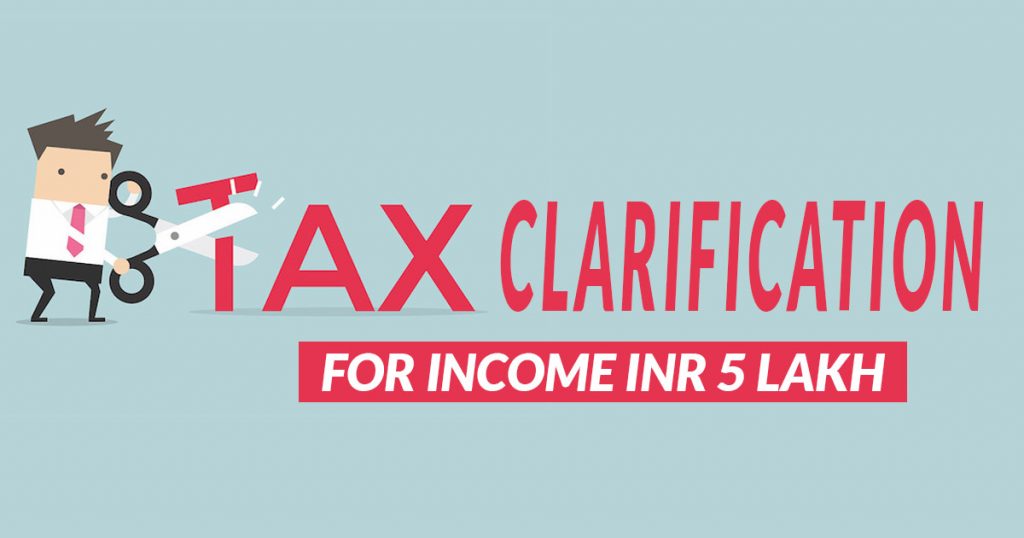
A lot of confusion has been created among people in India with the news flashing on the internet that the income tax slab has been stretched to INR 5 lakh. So, there is quite a debate among working people in India about whether they need to file returns or not, if they fall under the income slab of INR 2.5 lakh to INR 5 lakh.
A lot of confusion has been created among people in India with the news flashing on the internet that the income tax slab has been stretched to INR 5 lakh. So, there is quite a debate among working people in India about whether they need to file returns or not, if they fall under the income slab of INR 2.5 lakh to INR 5 lakh.
Many people believe that they don’t need to file their tax returns if their total income is below INR 5 lakh, which is not really True. The real fact is that no changes have been made in the income slab for the upcoming two years, i.e. FY 2019-20 and FY 2020-21 by the central government.
If we talk more about this in detail, then no Income Tax is payable up to Total Income of INR 5 lakh statement is partially correct. Confused how?
Let’s find answers to this.
The individuals do not have to pay any taxes if they are earning up to INR 5 lakh, but conditions apply clause is also added by the government.
Again there is a popular question related to this-
Is Income Tax Return Filing not Mandatory if Total Income below INR 5 lakh?
First of all, there are no changes made in Income Tax Slabs and rates for FY 2019-20 / AY 2020-21
So, one must first understand that the Income Tax Slabs for the FY 2018-19 has been retained by the government for the upcoming two fiscal years, i.e. FY 2019-2020 and FY 2020-21.
Here are the tax slabs that apply to Indian citizens:
- Income Tax exemption limit for all Indian Citizens (below 60 years) is still INR 2.5 lakh.
- Income Tax exemption limit for Senior Citizens (60 years or above) is still INR 3 lakh.
- Income Tax exemption for Very Senior Citizens (80 years or above) is still INR 5 lakh.
This essentially means that Income Tax Return Filing is still mandatory even if your Total Income is above INR 2.5 lakh.
So, when does an earning individual do not have to pay any tax if his/her Total Income is up to INR 5 lakh?
Well, a noteworthy change has been introduced by the government in the Sec 87A of the Income tax act. As per the updated Sec 87A, a taxpayer is eligible to get a tax rebate up to INR 12,500, if his total income falls below INR 5 lakh.
Here is the Explanation for the Same:
- Let’s assume a taxpayer’s Total Income = 500,000
- Exemption Limit = 250,000
- Taxable Income post exemption = 250,000
- Tax on Total Income post exemption ( at 5% rate) = 12,500
- Under Section 87A, new rebate provision= 12,500
Total Tax Payable = 0
What this essentially means is that if the total income of a working individual/citizen is INR 5 lakh or below INR 5 lakh in India, then he/she is eligible to get a tax rebate of up to INR 12,500 as per the recently modified section 87A of the Income Tax Act. So, no tax is required to be paid. But, again, one has to file the Income Tax Return, if the Total Income is above INR 2.5 lakh (in case of senior citizens INR 3 lakh and for very senior citizen INR 5 lakh).
Frequently Asked Questions
Q. Does every taxpayer whose total income falls below INR 5 lakh is eligible to get the tax rebate u/s 87A?
- The benefit of tax rebate u/s 87A can only be enjoyed by resident individuals in India. This rebate is not applicable in case of non-residents.
Q. Suppose a taxpayer whose income is below INR 5 lakh file the income tax return post the due date. Does he/she need to pay the penalty for the same?
- Yes, he/she need to pay the penalty u/s 234F, in case of missing the due date of income tax return filing.
Q. Does an individual whose total income exceeds INR 5 lakh is eligible for the tax rebate u/s 87A?
- No, the taxpayers whose income fall above INR 5 lakh, are not eligible for the tax rebate u/s 87A.

